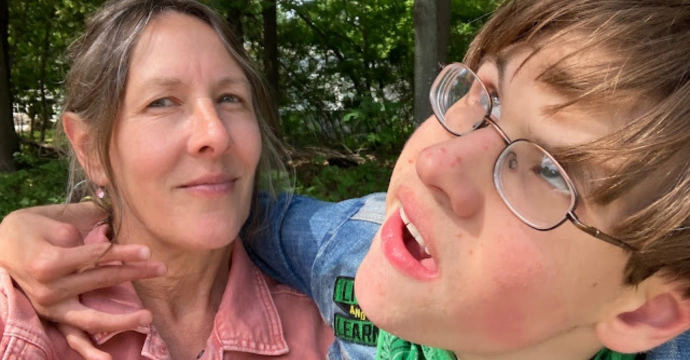My twenty-year-old son Calvin had his first seizure when he was eighteen months old. His prenatal brain anomalies have also caused him to be legally blind, physically and intellectually disabled, thus requiring round the clock hands-on aid. Despite myriad treatments, his seizures persist, causing him pain, disrupting his daily routine, and causing me and my husband dreaded anxiety and chronic sleep deprivation.
The seizures and the epilepsy drugs have interrupted Calvin’s development, caused harmful and lasting side effects and remain a formidable challenge for us all in that they impact every aspect of our son’s being.
Though recently Calvin’s seizures have dramatically decreased with the use of a newer drug, Calvin remains impossibly restless and often agitated, profoundly limiting his ability to engage in most activities. Moreover, on any given day, Calvin suffers what we think are bouts of pain, discomfort, and or manic/panic episodes. We don’t—and can’t—know the source of his misery. The episodes are harrowing, and usually come out of nowhere. Calvin is incapable of telling us what or how he is feeling, and so we have no recourse but to console him until they pass. We don’t know if these loathsome episodes are headaches, gastrointestinal distress, psychosis, seizures and/or the drugs used to treat them. The restlessness and pain episodes, which have been present for years, seem to be permanent, and have supplanted the seizures as our biggest challenges.
Not a day goes by without wondering what Calvin would have been like had there been a cure for his seizures, one that would have saved him from so much pain and misery. I wonder, if not for the seizures and the drugs, if Calvin would have been able to speak (he said his first and only word, “mama” before his first seizure). Perhaps his body and mind would have been able to remain calm in the absence of so many powerful mind-altering drugs. Maybe he would be able to sit still, walk without help, use the toilet, feed himself (he was on his way to mastering the use of a spoon when a combo of treatments robbed him of that skill) make friends, tell us his desires and dreams and what, if anything, hurts. Simply put, I lament that Calvin could have been so much happier and healthier, and so too would have we, if there were a cure. In other words, I’ve no doubt a cure would be a game changer.





